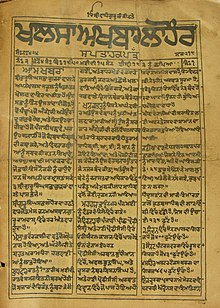Khalsa Akhbar
| Part of a series on |
| Sikh literature |
|---|
 |
| Sikh scriptures • Punjabi literature |
The Khalsa Akhbar (Punjabi: ਖ਼ਾਲਸਾ ਅਖ਼ਬਾਰ (Gurmukhi), خالصہ اخبار (Shahmukhi)), Lahore, was a weekly newspaper and the organ of the Lahore Khalsa Diwan, a Sikh society.[1][2] Published from Lahore in the Punjabi language (Gurmukhi script), the newspaper was established in 1886 and functioned sporadically till 1905.[3][4] Founded by Bhai Gurmukh Singh, a professor of Punjabi at the Oriental College, Lahore, who also established the Khalsa Press in Lahore, the paper was taken over by Giani Ditt Singh, a scholar and a poet.[5] It was one of the most prominent and influential Sikh periodicals prior to 1920.[6][7]
History

The newspaper was published with effect from 13 June 1886 through the efforts of Bhai Gurmukh Singh from Lahore.[1] However, Norman Gerald Barrier claims the paper was established in 1883.[2] The newspaper was founded through the joint-efforts of Gurmukh Singh, Jhanda Singh, and Ditt Singh, after the three had established the Khalsa Press in 1883.[2] Maharaja Hira Singh of Nabha State aided with the establishment of the Khalsa Press.[8]
It was a weekly newspaper of the Khalsa Diwan society being published in lithography and in Gurmukhi script. Its first two editors were Giani Jhanda Singh Faridkot and Sardar Basant Singh. Another editor who worked on the paper was Mayya Singh.[2] Later on, it was handed over to Giani Ditt Singh. The newspaper became a champion of the reformist elements of the contemporary Sikh society.[2]
In the 1 January 1887 new-year issue of the newspaper, it stated the following regarding the management situation of the Golden Temple in Amritsar, being one of the earliest precursory voices of the Gurdwara Reform movement:[9]
We appeal before the Khalsa community and the Government ... that the present committee for the management of the Golden Temple is neither based on the principles of the Khalsa Panth nor on Government legislation ... The administration is not supposed to interfere in religious matters.
— Khalsa Akhbar, 1 January 1887 issue
The newspaper continued to be published until 1889. After this, its publication stopped for sometime due to a legal libel suit filed by the Amritsari party regarding the publication of a play called Swapan.[10][11][2]
It resumed publication again on 1 May 1893 with Giani Ditt Singh as its editor. An experienced scholar and an expert in debates and discussions, he entered into many heated debates with representatives of Arya Samaj. The revived paper had around 1,000 subscribers.[2]
Giani Ditt Singh was an excellent writer of Punjabi prose and poetry and wrote many of his editorials in verse. He was the right-hand man of Bhai Gurmukh Singh and one of the pillars of Singh Sabha Lahore. He died in 1901. After him, Sardar Maeeya Singh Ahluwalia became the editor of Khalsa Akhbar and continued until 1905. The newspaper ceased publication in 1905 after the dissolution of Singh Sabha Lahore and due to some other reasons.[2]
References
- ^ a b Singh, Jagjit (1995). Siṅgh, Harbans (ed.). Khālsā Dīwān Lahore (3rd ed.). Patiala, Punjab, India: Punjab University, Patiala, 2011. pp. 481–482. ISBN 9788173805301. Retrieved 15 February 2020.
- ^ a b c d e f g h Barrier, N. G. (2004). "Sikh Journalism". In Singh, Harbans (ed.). The Encyclopedia of Sikhism. Vol. 4: S–Z (2nd ed.). Patiala Punjabi University. pp. 161–166. ISBN 817380530X.
- ^ Khalsa Akhbar, Lahore Religion and Nationalism in India: the case of the Punjab, by Harnik Deol. Routledge, 2000, p. 72. ISBN 0-415-20108-X.
- ^ Sikh Journalism:From 1800s to 1900s Archived 19 July 2011 at the Wayback Machine sikhcybermuseum.org.uk.
- ^ History of Punjabi Journalism Archived 19 June 2007 at the Wayback Machine By Harpreet Singh, Daily Excelsior, 20 June 2000.
- ^ Grewal, J. S. (March 2018). "2 - Colonial Rule and the Sikhs: (1849–1919)". Master Tara Singh in Indian History: Colonialism, Nationalism, and the Politics of Sikh Identity (Online ed.). Oxford University Press. ISBN 9780199089840.
The most important Sikh periodicals were the Khālsā Akhbār in Punjabi and the Khalsa in English, both of which were brought out from Lahore. The Nirguṇiārā and the Khālsā Samāchār in Punjabi and the Khalsa Advocate in English were published from Amritsar.
- ^ Barrier, Norman Gerald (3 January 1992). Jones, Kenneth W. (ed.). Religious Controversy in British India: Dialogues in South Asian Languages. SUNY Series in Religious Studies (Illustrated ed.). SUNY Press. p. 226. ISBN 9780791408285.
Also important in focusing the issues and personalities involved in Sikh pamphleteering are articles and correspondence in the three primary Sikh newspapers prior to 1920, The Khalsa Akhbar (Punjabi, c. 1889–1905), the Khalsa Samachar (Punjabi, 1899 to the present), and the Khalsa Advocate (1903–23, then becoming the Punjabi Khalsa Te Khalsa Advocate).
- ^ Grewal, J. S. (March 2018). "2 - Colonial Rule and the Sikhs: (1849–1919)". Master Tara Singh in Indian History: Colonialism, Nationalism, and the Politics of Sikh Identity (Online ed.). Oxford University Press. pp. 36–61. ISBN 9780199089840.
- ^ Grewal, J. S. (March 2018). "4 - Master Tara Singh in the Akali Movement: (1920–3)". Master Tara Singh in Indian History: Colonialism, Nationalism, and the Politics of Sikh Identity (Online ed.). Oxford University Press. pp. 86–103. ISBN 9780199089840.
- ^ Biography of Giani Ditt Singh Archived 2 February 2019 at the Wayback Machine sikh-history.com
- ^ Giani Ditt Singh Biography
External links
- CS1: long volume value
- Webarchive template wayback links
- Articles with short description
- Short description matches Wikidata
- EngvarB from March 2018
- Use dmy dates from March 2018
- Articles containing Punjabi-language text
- Defunct weekly newspapers
- History of Sikhism
- Sikhism in Lahore
- Weekly newspapers published in India
- Defunct newspapers published in India
- Punjabi-language newspapers published in India
- Mass media in Lahore
- Newspapers established in 1886
- Publications disestablished in 1905
- 1886 establishments in India
